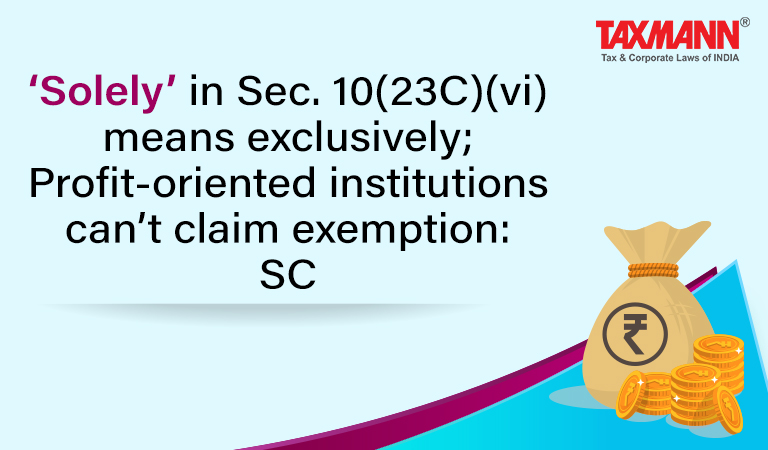‘Solely’ in Sec. 10(23C)(vi) means exclusively; Profit-oriented institutions can’t claim exemption: SC
- Blog|News|Income Tax|
- 2 Min Read
- By Taxmann
- |
- Last Updated on 21 October, 2022

Case Details: New Noble Educational Society v. CCIT - [2022] 143 taxmann.com 276 (SC)
Judiciary and Counsel Details
-
- Uday Umesh Lalit, CJI., S. Ravindra Bhat & Pamidighantam Sri Narasimha, JJ.
Facts of the Case
The subject matter of appeal in the instant case was the rejection of the appellant’s claim for registration as an institution/trust set up for the charitable purpose of education under the Income-tax Act, 1961. The Andhra Pradesh High Court held that the appellant was not created ‘solely’ for the purpose of education. It had other objects which means that it ceased to be an institution existing ‘solely’ for educational purposes.
The appellant relied upon the ruling of American Hotel and Lodging Association v Central Board of Direct Taxes (2008) 10 SCC 509 and Queen’s Education Society (2015) 8 SCC 47. It was submitted that the test for determination was whether the ‘principal’ or ‘main’ activity was education or not, rather than whether some profits were incidentally earned.
Supreme Court Held
The Supreme Court of India held that the interpretation adopted by the judgments in American Hotel as well as Queens Education Society as to the meaning of the expression ‘solely’ are erroneous.
The decisions in American Hotel and Queens Education Society did not explore the true meaning of the expression ‘solely’ in the context of educational institutions. The word “Solely” in section 10(23C)(vi) means only/exclusively and not primarily.
The requirement of the charitable institution, society or trust, etc., to ‘solely’ engage itself in education or educational activities, and not engage in any activity of profit, means that such institutions cannot have objects which are unrelated to education. In other words, all objects of society, trust, etc., must relate to imparting education or be with educational activities.
Where the objective of the institution appears to be profit-oriented, such institutions would not be entitled to approval under Section 10(23C). At the same time, where surplus accrues in a given year or set of years per se, it is not a bar, provided such surplus is generated in the course of providing education or educational activities.
The seventh proviso to Section 10(23C), as well as Section 11(4A), refers to profits that may be ‘incidentally’ generated or earned by the charitable institution. The same applies only to those institutions which impart education or are engaged in activities connected to education.
The reference to ‘business’ and ‘profits’ in the seventh proviso to Section 10(23C) and Section 11(4A) merely means that the profits of a business which is ‘incidental’ to the educational activity. In relation to education, it is the sale of textbooks, providing school bus facilities, hostel facilities, etc.
Thus, a trust, university or other institution imparting education, should necessarily have all its objects aimed at imparting or facilitating education. Having regard to the plain and unambiguous terms of the statute and the substantive provisions which deal with exemption, there cannot be any other interpretation.
Disclaimer: The content/information published on the website is only for general information of the user and shall not be construed as legal advice. While the Taxmann has exercised reasonable efforts to ensure the veracity of information/content published, Taxmann shall be under no liability in any manner whatsoever for incorrect information, if any.

Taxmann Publications has a dedicated in-house Research & Editorial Team. This team consists of a team of Chartered Accountants, Company Secretaries, and Lawyers. This team works under the guidance and supervision of editor-in-chief Mr Rakesh Bhargava.
The Research and Editorial Team is responsible for developing reliable and accurate content for the readers. The team follows the six-sigma approach to achieve the benchmark of zero error in its publications and research platforms. The team ensures that the following publication guidelines are thoroughly followed while developing the content:
- The statutory material is obtained only from the authorized and reliable sources
- All the latest developments in the judicial and legislative fields are covered
- Prepare the analytical write-ups on current, controversial, and important issues to help the readers to understand the concept and its implications
- Every content published by Taxmann is complete, accurate and lucid
- All evidence-based statements are supported with proper reference to Section, Circular No., Notification No. or citations
- The golden rules of grammar, style and consistency are thoroughly followed
- Font and size that’s easy to read and remain consistent across all imprint and digital publications are applied



 CA | CS | CMA
CA | CS | CMA
